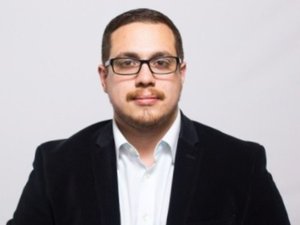Michelle Brown didn't notice how transformative a single lesson in the classroom could be until she was a teacher herself. She was always a self-proclaimed bookworm, but her teaching background in Teach for America and other middle school reading courses opened her eyes to the true impact a teacher has.
Her experience is also what opened her eyes to the resource disparity between urban and rural school districts. When she was working on her master's degree in Education Policy at Harvard, she had an idea for how she could help alleviate that disparity: CommonLit.org.
CommonLit is a nonprofit that provides free reading resources for educators and their students. Brown moved her company from Boston to D.C. last year to join 1776. Now, they're moving out of the 1776 offices and into their own office space in Eastern Market.
How did you find your love for education?
I was fortunate enough to have a really good education growing up. I used to be a bookworm all the time, but it wasn't until I started teaching that I really came to believe how transformative just a single lesson can be or a single book for kids can really change a kid's perspective and put a child on a totally different track in life. I really believe that.
When I started Common Lit, I was just thinking about the power of free resources, and especially the power of high quality free resources.
I was just thinking about the power of free resources, and especially the power of high quality free resources.
What attracted you to entrepreneurship?
What motivated me to go into tech specifically was just thinking about how scalable it is. So when I was a teacher, and I had four classes of kids, and in a single year, I might impact 100 kids, in the entire year.
It really was attractive to me that in a single day I could affect millions of students, or tens of millions of students in the long run.
What's next?
We just got a $3.9 million grant from the Department of Education, so what that funds is continued development of our free products. During the two-year grant period, we're specifically focused on reaching students in high poverty schools and also rural schools. We're really focusing on "How can we actually move the needle in reading and writing achievement for those kids in an online tool?"
What was that moment like when you found out you were getting this grant?
It was a total game-changer for the organization. I wrote the grant, and it was my first time writing a grant like that, so I wasn't sure what was going to happen, and it was pretty surreal.
I just got an email, nobody called me. And I was thinking about the horror if it had gone to spam.
You all just moved to D.C. recently. What's that been like?
So I founded the organization while I was in graduate school at Harvard, and then in October 2015, we moved to Washington, D.C. and I started at the 1776 incubator.
A year later, we're moving out of the incubator and into offices in Eastern Market, and expanding our team from three people to 15 people.
I'm really proud to say that D.C. is our home.
Why stay in D.C. after moving from 1776?
So D.C. has been really good to us. We have been able to attract incredible talent. It's also the hub of a lot of great things happening with school reform, so we're really connected to the school reform community.
Also, we serve students all over the nation, so being in D.C. helps us poise ourselves as a national nonprofit.
What makes the D.C. startup scene unique?
What I've noticed is that people are really generous with their network in a way that people in other places aren't. It really is a very open and inclusive community, and the people here have been sharing their thoughts since the beginning. I'm really proud to say that D.C. is our home.
Think about growth before you get to a growth period.
What advice do you have for entrepreneurs?
Focus on building your product first. You can't go anywhere until you have a product that works, at least with a small community. I think that is one of the things that we did right. Early on, I put all of my energy into just building a prototype and then testing that prototype to prove that it could work.
What was the biggest thing that you have learned so far from building your own business?
Think about growth before you get to a growth period. When you reach an inflection point like this or when you get a windfall, it comes with a whole new set of challenges, and so don't just wait for it to happen. Be prepared for it to happen.




